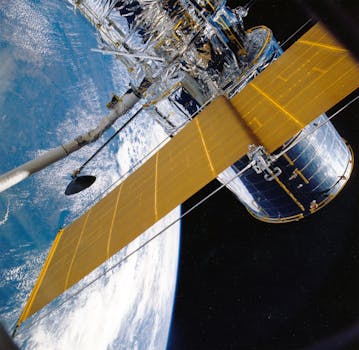The Future of Satellites: Revolutionizing Global Connectivity

The Future of Satellites: Revolutionizing Global Connectivity
The future of satellites is poised to revolutionize global connectivity, enabling faster and more reliable communication networks. With advancements in space technology, satellites are becoming increasingly important for a wide range of applications, from navigation and communication to weather forecasting and Earth observation. In this article, we will explore the current state of satellite technology and the exciting developments that are shaping the future of this industry.
Current State of Satellite Technology
Satellites have been in use for several decades, providing a wide range of services including television broadcasting, telecommunications, and navigation. However, the current state of satellite technology is limited by the high cost of launching and operating satellites, as well as the limited availability of spectrum and orbital slots. Despite these challenges, the demand for satellite services is increasing, driven by the growing need for global connectivity and the expanding use of satellite-based applications.
Advancements in Space Technology
Recent advancements in space technology are helping to overcome the limitations of traditional satellite systems. One of the most significant developments is the emergence of small satellites, also known as smallsats. Smallsats are smaller and less expensive than traditional satellites, making them more accessible to a wider range of users. They are also more flexible and can be launched into a variety of orbits, enabling a wider range of applications.
Another key development is the use of reusable launch vehicles, which are reducing the cost of accessing space. Companies such as SpaceX and Blue Origin are leading the way in this area, with their reusable rockets enabling multiple launches from the same vehicle. This technology has the potential to significantly reduce the cost of launching satellites and other spacecraft, making space more accessible to a wider range of users.
Applications of Satellites
Satellites have a wide range of applications, from navigation and communication to weather forecasting and Earth observation. One of the most significant applications of satellites is in the provision of global connectivity. Satellites are able to provide internet access to remote and underserved communities, enabling them to connect with the rest of the world. This is particularly important in areas where traditional communication infrastructure is limited or non-existent.
Satellites are also used for navigation, providing location information and timing signals to a wide range of users. This includes aviation, maritime, and land-based transportation, as well as personal navigation devices such as GPS. Weather forecasting is another key application of satellites, with satellites providing critical data on weather patterns and climate trends. This information is used to predict weather events and to monitor climate change.
Future Developments
The future of satellites is exciting and rapidly evolving. One of the most significant developments is the emergence of satellite constellations, which are networks of satellites that work together to provide global coverage. These constellations are being developed by companies such as OneWeb and Amazon, and have the potential to provide high-speed internet access to remote and underserved communities.
Another key development is the use of satellites for Earth observation. Satellites are able to provide high-resolution images of the Earth, which can be used for a wide range of applications, including agriculture, forestry, and disaster response. This information can be used to monitor crop health, track deforestation, and respond to natural disasters.




